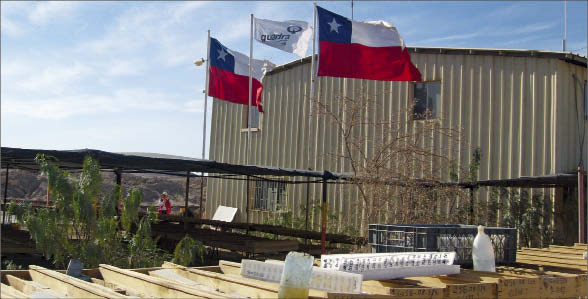Quadra FNX Mining (QUX-T) is hooking up with Sumitomo to develop the sizable Sierra Gorda copper-molybdenum project in the Atacama Desert of northern Chile.
Quadra signed a joint-venture agreement with Sumitomo and released a positive feasibility study for the wholly owned project in mid-May.
“What today’s announcement means to us is we are now poised to achieve our long-standing goal of 500 million lbs. of copper (per year),” said president and CEO Paul Blythe on a May 16 conference call. “And this provides us with a project that has a reserve of over twenty years – quite different from anything else we have in our portfolio now.”
Blythe added that the company is “excited” to work with such a financially strong and technically experienced partner to get the project online in 2014.
Sierra Gorda is expected to produce up to 500 million lbs. copper per year. The partners estimate that it would cost US$3 billion to get the project up and running. This amount includes capital costs, working capital, interest during construction and costs already incurred.
Derek White, executive vice-president of corporate development, said during the call that Sumitomo not only has the financial and technical skills, but also the reputation and credibility the company was looking for in a partner. Having spent four centuries in mining and metal smelting, with 13 existing substantial mining partnerships, Sumitomo met the company’s requirements with “flying colours,” White said.
The joint venture (JV) and project funding would be split 55-45, with Quadra retaining a 55% interest, and Sumitomo the rest. The JV would also be governed by a shareholders’ counsel comprising two members from each company.
Sumitomo would provide US$724 million after closing the deal, which requires normal anti-trust approvals.
Sumitomo would also be responsible for arranging US$1 billion in project financing, non-recourse to Quadra. If the funding is not available, Sumitomo must provide a US$800-million shareholder loan, which will also be non-recourse to the Vancouver-based miner.
Quadra expects to provide its share of funding – about US$650 million – through a mix of cash and debt financing, which the company is exploring with JP Morgan.
White noted the company has no plans of issuing equity to fund the development of the project.
However, if the JV deal does not close by Aug. 1, Sumitomo would loan Quadra US$360 million by providing US$90 million per month from August to November. Quadra would have 12 months to repay the bridge loan if the deal is not sealed by Dec. 31.
Also under the JV arrangement, Sumitomo has the right to buy 50% of the copper concentrate. Quadra has the right to sell the remaining half, which would be marketed by the JV.
The feasibility study envisions Sierra Gorda as an open-pit mine, initially processing 110,000 tonnes per day to produce both copper and molybdenum concentrates. The company plans to ramp up throughput to 190,000 tonnes per day in the fourth year of operations.
It would cost Quadra an extra US$818 million over the initial capex of US$2.87 billion to expand throughput to 190,000 tonnes per day, which would start in 2017.
Once off the ground, Sierra Gorda would churn out an average of 438 million lbs. copper, 25 million lbs. molybdenum and 64,000 oz. gold per year over its 20-plus-year life.
The deposit has three types of ore: transition, high acid-soluble molybdenum, and sulphide, which hosts the majority of the resource. All three zones contain sulphide mineralization that could be processed in a flotation plant.
Total reserves in all three zones amount to 1.3 billion tonnes grading 0.39% copper, 0.024% moly, 0.065 gram gold for 11 billion lbs. copper, 678 million lbs. moly and 2.67 million oz. gold. The deposit has a strip ratio of 2.67.
The project also has a measured and indicated sulphide resource of 1.9 billion tonnes grading 0.51% copper equivalent.
The company notes that over the mine’s life it would generate about 76% of its revenue from copper, 20% from moly and 4% from gold.
The study predicts that it would cost US56¢ to produce a pound of copper during the first five years, net of byproduct credits, and about US$1.15 per lb. over the life of mine, assuming prices of US$2.50 per lb. copper, US$12 per lb. moly and US$1,000 per oz. gold.
With those assumed prices, after-tax net present value (NPV) at an 8% discount rate is US$720 million. However, at spot prices of US$4 per lb. copper, US$15 per lb. moly and US$1,300 per oz. gold, the after-tax NPV at an 8% rate rises to US$5.1 billion.
Mine and plant sustaining costs are estimated at US$1.04 billion, averaging about US$52 million per year over the life of the mine.
The company says an upside opportunity at Sierra Gorda could result from the 200 million tonnes of the 237-million-tonne oxide resource grading 0.34% copper that was treated as waste and not included in the mine plan.
However, the possibility of processing this oxide resource was included in the environmental impact assessment permits, which Quadra expects to receive in June.
On news of the JV and feasibility study, the company shares rose 5.7% or 79¢ to close the day at $14.48 per share on 9.8 million shares traded.


Be the first to comment on "Quadra attracts Sumitomo to Sierra Gorda"